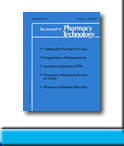 |
 |
Autoimmune Hepatitis Induced by Interferon Beta Therapy in a Patient with Multiple
Sclerosis: A Case Report
Ali Benmousa, Ahmed Helmy, Faisal M Sanai, and Zuhal M Ghandour
To request full article click here.
OBJECTIVE: To report a case of a woman who had multiple sclerosis and developed autoimmune hepatitis (AIH) induced by interferon beta therapy.
Case Summary: A 35-year-old woman with multiple sclerosis was being treated with interferon beta when she presented with fatigue and jaundice. Liver biochemistry testing revealed acute hepatitis (alanine and aspartate aminotransferase values >10 times the upper limit of normal) that was histologically consistent with AIH. Our patient had a score of 9 on the Roussel Uclaf Causality Assessment Method scale, indicating a high probability that hepatotoxicity in this case was related to interferon beta therapy. The patient had spontaneous clinical and biochemical improvement after stoppage of treatment. However, when she resumed interferon beta therapy, derangement of liver function reappeared, which again responded well to discontinuation of interferon.
Discussion: Interferons can induce many autoimmune diseases due to their immunomodulatory effects. Autoimmune thyroid diseases and, to a lesser extent, skin and pulmonary involvement, are frequently reported during interferon alfa treatment for chronic hepatitis C. Several different forms of hepatotoxicity have also been described with interferon alfa and beta therapy, but few cases of AIH induced by interferon are reported in the literature. AIH has been described in association with interferon alfa therapy; however, this association with interferon beta therapy is extremely rare, and only a handful of cases have been described. Moreover, reports of previous cases were not rechallenged with the same medication, thereby failing to demonstrate firm evidence of causality. This is the first report of the disease reappearing upon drug rechallenge. In addition, we have shown that interferon-induced AIH can be suitably treated by drug withdrawal rather than by institution of steroid therapy.
Conclusions: Practitioners need to be aware of the potential complication of AIH induced by interferon beta; this condition occurs independently of the typically benign enzyme elevations frequently reported with this drug.
J Pharm Technol 2009;25:374-7.
To request full article click here.
|
|
|
||
|

